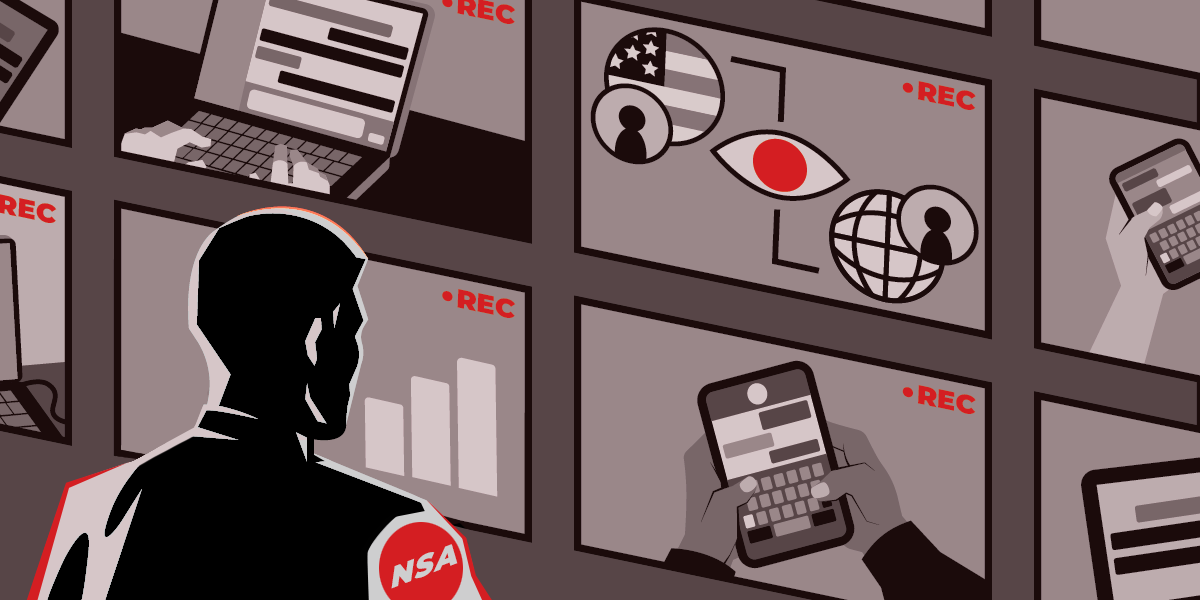Yesterday, the House of Representatives voted against considering a largely bad bill that would have unacceptably expanded the tentacles of Section 702 of the Foreign Intelligence Surveillance Act, along with reauthorizing it and introducing some minor fixes. Section 702 is Big Brother’s favorite mass surveillance law that EFF has been fighting since it was first passed in 2008. The law is currently set to expire on April 19.
Yesterday’s decision not to decide is good news, at least temporarily. Once again, a bipartisan coalition of law makers—led by Rep. Jim Jordan and Rep. Jerrold Nadler—has staved off the worst outcome of expanding 702 mass surveillance in the guise of “reforming” it. But the fight continues and we need all Americans to make their voices heard.
Use this handy tool to tell your elected officials: No reauthorization of 702 without drastic reform:
TELL congress: 702 Needs serious reforms
Yesterday’s vote means the House also will not consider amendments to Section 702 surveillance introduced by members of the House Judiciary Committee (HJC) and House Permanent Select Committee on Intelligence (HPSCI). As we discuss below, while the HJC amendments would contain necessary, minimum protections against Section 702’s warrantless surveillance, the HPSCI amendments would impose no meaningful safeguards upon Section 702 and would instead increase the threats Section 702 poses to Americans’ civil liberties.
Section 702 expressly authorizes the government to collect foreign communications inside the U.S. for a wide range of purposes, under the umbrellas of national security and intelligence gathering. While that may sound benign for Americans, foreign communications include a massive amount of Americans’ communications with people (or services) outside the United States. Under the government’s view, intelligence agencies and even domestic law enforcement should have backdoor, warrantless access to these “incidentally collected” communications, instead of having to show a judge there is a reason to query Section 702 databases for a specific American’s communications.
Many amendments to Section 702 have recently been introduced. In general, amendments from members of the HJC aim at actual reform (although we would go further in many instances). In contrast, members of HPSCI have proposed bad amendments that would expand Section 702 and undermine necessary oversight. Here is our analysis of both HJC’s decent reform amendments and HPSCI’s bad amendments, as well as the problems the latter might create if they return.
House Judiciary Committee’s Amendments Would Impose Needed Reforms
The most important amendment HJC members have introduced would require the government to obtain court approval before querying Section 702 databases for Americans’ communications, with exceptions for exigency, consent, and certain queries involving malware. As we recently wrote regarding a different Section 702 bill, because Section 702’s warrantless surveillance lacks the safeguards of probable cause and particularity, it is essential to require the government to convince a judge that there is a justification before the “separate Fourth Amendment event” of querying for Americans’ communications. This is a necessary, minimum protection and any attempts to renew Section 702 going forward should contain this provision.
Another important amendment would prohibit the NSA from resuming “abouts” collection. Through abouts collection, the NSA collected communications that were neither to nor from a specific surveillance target but merely mentioned the target. While the NSA voluntarily ceased abouts collection following Foreign Intelligence Surveillance Court (FISC) rulings that called into question the surveillance’s lawfulness, the NSA left the door open to resume abouts collection if it felt it could “work that technical solution in a way that generates greater reliability.” Under current law, the NSA need only notify Congress when it resumes collection. This amendment would instead require the NSA to obtain Congress’s express approval before it can resume abouts collection, which―given this surveillance’s past abuses—would be notable.
The other HJC amendment Congress should accept would require the FBI to give a quarterly report to Congress of the number of queries it has conducted of Americans’ communications in its Section 702 databases and would also allow high-ranking members of Congress to attend proceedings of the notoriously secretive FISC. More congressional oversight of FBI queries of Americans’ communications and FISC proceedings would be good. That said, even if Congress passes this amendment (which it should), both Congress and the American public deserve much greater transparency about Section 702 surveillance.
House Permanent Select Committee on Intelligence’s Amendments Would Expand Section 702
Instead of much-needed reforms, the HPSCI amendments expand Section 702 surveillance.
One HPSCI amendment would add “counternarcotics” to FISA’s definition of “foreign intelligence information,” expanding the scope of mass surveillance even further from the antiterrorism goals that most Americans associate with FISA. In truth, FISA’s definition of “foreign intelligence information” already goes beyond terrorism. But this counternarcotics amendment would further expand “foreign intelligence information” to allow FISA to be used to collect information relating to not only the “international production, distribution, or financing of illicit synthetic drugs, opioids, cocaine, or other drugs driving overdose deaths” but also to any of their precursors. Given the massive amount of Americans’ communications the government already collects under Section 702 and the government’s history of abusing Americans’ civil liberties through searching these communications, the expanded collection this amendment would permit is unacceptable.
Another amendment would authorize using Section 702 to vet immigrants and those seeking asylum. According to a FISC opinion released last year, the government has sought some version of this authority for years, and the FISC repeatedly denied it—finally approving it for the first time in 2023. The FISC opinion is very redacted, which makes it impossible to know either the current scope of immigration and visa-related surveillance under Section 702 or what the intelligence agencies have sought in the past. But regardless, it’s deeply concerning that HPSCI is trying to formally lower Section 702 protections for immigrants and asylum seekers. We’ve already seen the government revoke people’s visas based upon their political opinions—this amendment would put this kind of thing on steroids.
The last HPSCI amendment tries to make more companies subject to Section 702’s required turnover of customer information in more instances. In 2023, the FISC Court of Review rejected the government’s argument that an unknown company was subject to Section 702 for some circumstances. While we don’t know the details of the secret proceedings because the FISC Court of Review opinion is heavily redacted, this is an ominous attempt to increase the scope of providers subject to 702. With this amendment, HPSCI is attempting to legislatively overrule a court already famously friendly to the government. HPSCI Chair Mike Turner acknowledged as much in a House Rules Committee hearing earlier this week, stating that this amendment “responds” to the FISC Court of Review’s decision.
What’s Next
This hearing was unlikely to be the last time Congress considers Section 702 before April 19—we expect another attempt to renew this surveillance authority in the coming days. We’ve been very clear: Section 702 must not be renewed without essential reforms that protect privacy, improve transparency, and keep the program within the confines of the law.
TELL congress: 702 Needs serious reforms



